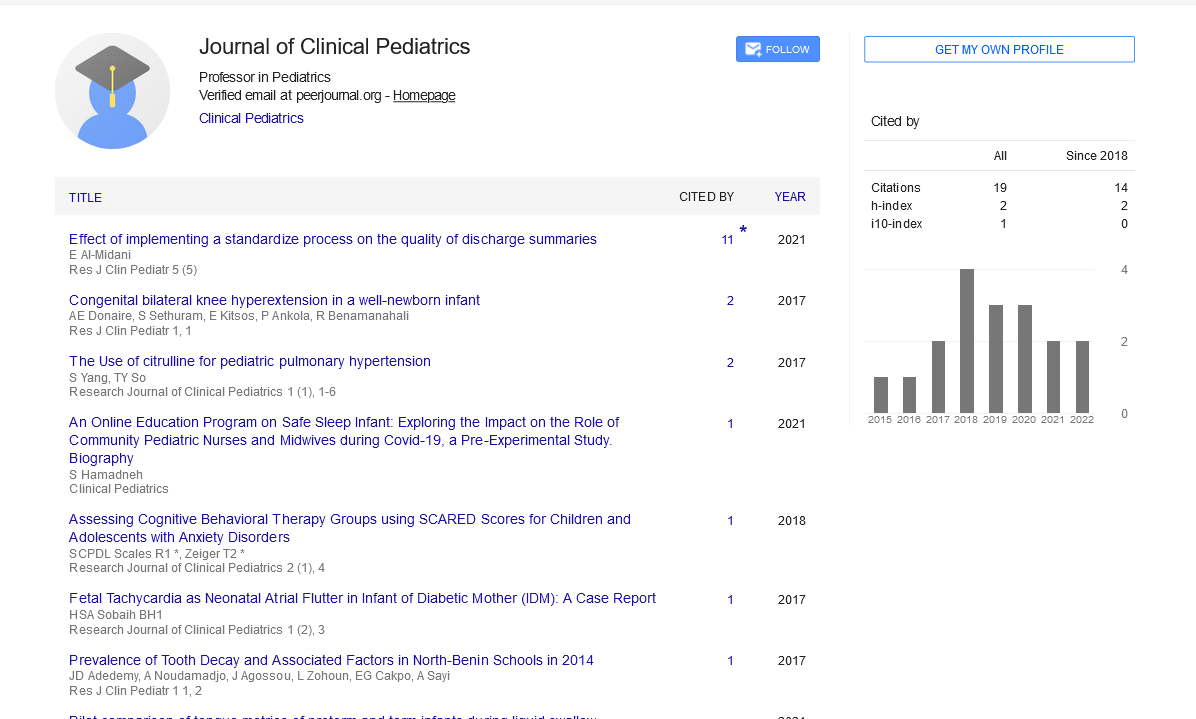Opinion Article, Res J Clin Pediatr Vol: 7 Issue: 1
Pediatric Gastroenterology: A Comprehensive Overview
John Paul*
1Department of Pediatrics, University of Melbourne, Parkville VIC 3010, Melbourne, Australia
*Corresponding Author: John Paul
Department of Pediatrics, University of
Melbourne, Parkville VIC 3010, Melbourne, Australia
E-mail: john.paul@aus.edu.au
Received date: 16 February, 2023, Manuscript No. RJCP-23-96082;
Editor assigned date: 20 February, 2023, PreQC No. RJCP-23-96082 (PQ);
Reviewed date: 10 March, 2023, QC No. RJCP-23-96082;
Revised date: 17 April, 2022, Manuscript No. RJCP-23-96082 (R);
Published date: 24 April, 2023, DOI: 10.4172/Rjcp.1000140
Citation: Paul J (2023) Pediatric Gastroenterology: A Comprehensive Overview. Res J Clin Pediatr 7:1.
Description
Pediatric gastroenterology is a specialized field of medicine that focuses on the digestive health of infants, children, and adolescents. The digestive system is responsible for breaking down food into nutrients that can be absorbed and used by the body. Pediatric gastroenterologists work to diagnose and treat digestive conditions in children, from infancy through adolescence. This manuscript provides a comprehensive overview of pediatric gastroenterology, discussing the anatomy and physiology of the digestive system, common digestive conditions in children, diagnostic tools, and treatment options.
Anatomy and physiology of the digestive system
The digestive system is composed of the gastrointestinal tract and associated organs, including the liver, pancreas, and gallbladder. The gastrointestinal tract is a long tube that begins at the mouth and ends at the anus. It includes the esophagus, stomach, small intestine, and large intestine. The liver produces bile, which helps break down fats in the small intestine, while the pancreas produces enzymes that aid in digestion.
Common digestive conditions in children
Pediatric gastroenterologists diagnose and treat a wide range of digestive conditions in children. Some of the most common digestive conditions in children include Gastroesophageal Reflux Disease (GERD), Inflammatory Bowel Disease (IBD), celiac disease, and food allergies. GERD is a condition in which the contents of the stomach reflux into the esophagus, causing symptoms such as heartburn and regurgitation. IBD includes Crohn's disease and ulcerative colitis, which are chronic conditions characterized by inflammation of the digestive tract. Celiac disease is a genetic disorder in which the body cannot tolerate gluten, a protein found in wheat, barley, and rye. Food allergies can cause a range of symptoms, including digestive problems such as nausea, vomiting, and diarrhea.
Diagnostic tools
Pediatric gastroenterologists use a variety of tools to diagnose digestive conditions in children. These may include imaging tests such as X-rays and CT scans, endoscopy, which involves inserting a thin, flexible tube into the digestive tract to visualize and sample tissue, and blood tests to check for specific markers of digestive conditions. In addition, specialized tests such as breath tests and allergy testing may be used to diagnose specific conditions such as lactose intolerance or food allergies.
Treatment options
Treatment options for digestive conditions in children vary depending on the specific condition and its severity. In general, treatment may involve medications such as acid reducers, antiinflammatory drugs, and antibiotics. Dietary changes may also be recommended, such as avoiding specific foods or adopting a special diet for conditions such as celiac disease. In some cases, surgery may be necessary to repair or remove damaged tissue or organs.
Conclusion
Pediatric gastroenterology is a specialized field of medicine that focuses on the digestive health of infants, children, and adolescents. Digestive conditions can have a significant impact on the overall health and quality of life of children, and early diagnosis and management are key to improving outcomes. Pediatric gastroenterologists use a range of diagnostic tools and treatment options to address digestive conditions in children and optimize their digestive health.
 Spanish
Spanish  Chinese
Chinese  Russian
Russian  German
German  French
French  Japanese
Japanese  Portuguese
Portuguese  Hindi
Hindi 
